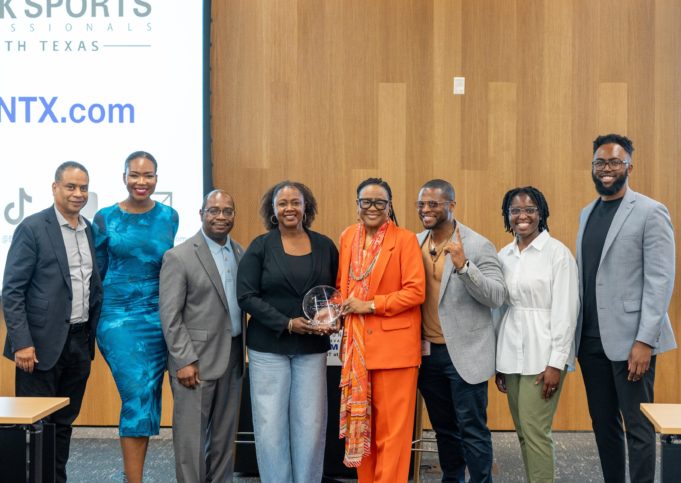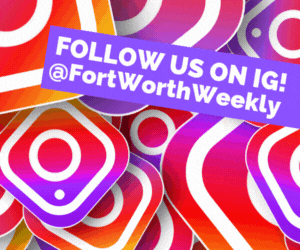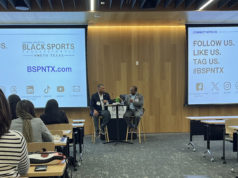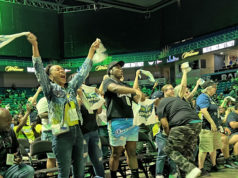Near the beginning of this past weekend’s 2025 Black Sports Professionals North Texas Summit, Scottie Rodgers, the organization’s marketing & communications committee chair, commented about the attendee composition.
“This room has people at various stages of their careers. We got people that are trying to start their career, we got people that are in the middle of their career, and we got people that are toward the tail end of their career.”
A lot of the wisdom dispensed during the event’s panels involved advice on getting a job in the sports business and also how to turn one’s current gig into the next opportunity. Many panelists told stories from their own paths. The specific examples they described had less to do with specific action items, like what to put on one’s LinkedIn profile, and more to do with cultivating a way of thinking that could position a person for advancement.
Derek Eagleton, senior vice president of media and programming for the Dallas Cowboys, talked about training one’s brain in what he considered two key foundational skills.
“Creativity and discipline are what make the difference between good employees and great employees,” he said. For the latter, he uses fitness training to drive his mental training.
“For me, it’s running. I run long distance races, and the fact of the matter is it’s not about the race. It is about the 16 weeks of training. Four days out of the week,” he said. “I have to get myself out of the bed, even when I want to stay in bed, even when there are reasons why it makes more sense to stay in bed, because I didn’t have a great night’s sleep. I got a big thing going on today. I need to go ahead and get the rest. Get up anyway and go train.”
Eagleton sits down at his drum kit and pounds some snares and cymbals to drill his creativity. While he works in a segment of the industry in which creative talents are consistently on display, he suggested cultivating one’s imaginativeness can help anyone.
“Sometimes people say, ‘Well, I’m not creative. So why does creativity matter?’ I’m not an accountant, so take this for what it’s worth, but I would assume what makes a great accountant different from a good accountant is their ability to understand how to make the numbers tell the story that you wanted to tell, right? I would say, in almost every career path, creativity matters. Your ability to think outside the box and think differently than most people who are doing your job makes a difference.”
Employees who can think out of the box help companies innovate and grow. That’s especially important when one’s line of business changes rapidly, as does Eagleton’s.
“I remember when I first started the (Cowboys’) website. I remember there were people who were in the magazine and newspaper business who were just really, really obstinate when it came to web. They were like, why would we give away content for free? People are paying for it now. And instead of getting on board and figuring out how they could then transition the content they were already creating for those platforms onto web, they were resistant. And what it did was it allowed people like me to step in,” he said of how he leveraged his digital knowledge base to advance in a transforming industry.
“I tell my people all the time, never, ever under my watch become just creators for a particular platform. We are content creators, and we will always create content for whatever that platform is. Our job is to engage audiences. So when you talk about consumption, it really is ever-evolving, and we have to keep creating new content. We figure out the new platforms, we learn what works on those platforms, and then we program the heck out of them. And then when the next one comes along, we jump onto that one, we learn it, and we program the heck out of it. That’s how you, in my opinion, stay ahead of the game.”
Not getting stuck in one way of doing things makes for good advice for any job. When Cynt Marshall became CEO of the Dallas Mavericks, she had no choice but to educate herself on the inner workings of the trade she had just joined after 36 years at AT&T.
When I think sports, I would think my favorite teams, my favorite players,” she explained. “It actually wasn’t until I got to the Mavs where I saw this whole ecosystem, like, everything behind the scenes with the teams, but then also all of the people who touch this industry.”
She suggested understanding the big picture wasn’t just for CEOs, either.
“Get to know the whole ecosystem,” she advised job seekers looking to work in sports. “The first thing is to understand this industry, and then think about the skillset that you have and where you could start out.”
Jenn Hunter, chief impact officer at the Big 12 Conference, suggested during her panel that one must then turn that industry knowledge into action at one’s company, no matter where one ranks in the hierarchy.
“You have to be able to strategize and create strategy and really understand your markets,” she said. She then supplied an example from when she worked at the Portland Trail Blazers of the NBA. Her title at the Blazers was “Senior Director of Diversity, Equity & Inclusion.” She took her expertise in that field and looked to deploy it in a way that could impact the organization’s big picture.
“Somebody gave me just a breakdown of how our different ethnic groups were spending. And I was noticing that the Asian community was out-indexing their representation in Portland, also noticed that the Black community was also out-indexing. So when I say out-index, they were purchasing into our product, into season tickets, at a rate higher than their population afforded, which means that there was an appetite,” Hunter said. “32% of Black folks in Portland were homeowners, which out-index national trends, which means that you also now have Black people with money, but we weren’t doing anything to engage in those communities. Communities of color are driven by relationships. They’re not transactional.”
Hunter turned her analysis into action items.
“I was like, let’s take a step back and look at the emerging communities. The Asian community is the largest-growing community in the Pacific Northwest. We need to start tapping into that,” she told the crowd of 120 attendees. “We started doing focus groups. We started finding out what the community needed. We started using those cultural months to highlight businesses in the community.”
She felt the strategic effort she initiated left a lasting impression on the franchise.
“I’m proud of being able to use DEI to drive the business strategy, to be able to sustain that organization. Even though I’m gone, they always send me stuff, like, ‘Girl, look what you did.’”
Seeing the wider picture and understanding organizational goals matters in carving out a niche for oneself. It’s also an expectation in many firms.
Monique Boyd serves as general manager for Legends Hospitality at the Cowboys-owned complex at The Star.
“Everybody on our team really has to have the same goal and the same mindset, because if I have 15 directors that are working on different assets, they need to be able to understand how important the brand is as well, and how to make money from their vertical,” she noted.
Marshall, who received the National Society of Black Sports Professionals North Texas Legacy Award at the event, suggested that even entry-level aspirants could position themselves through an understanding of their industries.
“I tell the college students, ‘You have some experience. You’d be surprised how the skills and experiences you have translate,’” she said. “Presenting who you are and where you add value, to me, is the most important thing.”
The panelists who embraced the big picture described an entrepreneurial way of thinking companies often value in employees. Two panelists who owned their own firms, Michael Ledo from RISE Sports Advisors and Carlton Dixon of Reveal Suits, had seen openings in the sports marketplace and started building their places in the industry.
“We are focused on developing athlete entrepreneurs and investors,” said Ledo, whose firm serves as a sort of family office for professional athletes. “When people have a family office, they have had a liquidity event where they’ve sold a company for $100 million or so, they have a net worth over $25 million and you need an off-the-field executive team to help manage that. In our case, we use the career earnings for our clients as a liquidity event.”
Credibility is vital for Ledo’s business. Dixon’s company creates custom suits branded with official marks and other designs. Credibility matters for Dixon, too. He pointed out the importance of developing connections.
“It’s really just about gaining the trust of the athletic directors, of the licensing teams, and getting them to say, ‘Yes, we want your brand to represent our institution,’” he said of the university portion of his model. “Doing things with excellence, protecting your brand, protecting your image, making sure you’re always presenting yourself the right way – that can lead to some really great relationships.”
Eagleton said “I wish I would have known how important relationship-building was when I started.” He suggested finding other entry-level professionals in the market segment one wants to join and networking with them for ideas about higher-level influencers.
Jasmine Williams, football operations manager at Roc Nation Sports, suggested that building networks within one’s current company can help one’s career track.
“A lot of times your referrals are going to come from your peers. Sports is a very competitive industry. We all know that, and so it kind of can feel like you’re competing against the next person for this one role. But don’t have that mindset. Always have that mindset of let me network across, let me develop these relationships now and then. We can rise together. We can grow together.”
In order for a peer network to have value, one has to show those co-workers one is worthy of their referrals and counsel. Rich Clark, a former Air Force general who now serves as executive director of the College Football Playoff, provided an example that demonstrates how mindset truly can matter in such situations.
“When I was a pilot in the Air Force, I went to pilot training late because I was a graduate assistant football coach at the Air Force Academy. And when I got to my new squadron, I was a captain, so I was kind of senior to the lieutenants. But when I got there, guess what? They made me the snack bar officer. I was, like, ‘Snack bar officer, you got lieutenants that do that,’ and they’re like, ‘Well, the newest copilot always does that, and you’re the newest copilot.’ I was, like, ‘All right, well, then I’m going to kill it,’” Clark explained. “I got a list of the things that people like. I started shopping at Costco instead of Target. I was doing all kinds of stuff. And people were going, ‘Man, the snack bar has never been like this before.’ Plus, I like food, so I know what’s going to be good in there. And it was just so awesome, the new snack bar, and we started making money.”
His story drove home how any job can impact business success when well-executed.
“What your favorite job ought to be is the one we give you, and you ought to do it to the absolute best of your ability,” he said. “People are always watching you.”
A gathering like Saturday’s provides educational value for everyone in the industry, but especially for young people. Beyond the advice provided via their summit, BSPNTX, in part through the efforts of Scholarship Committee Chair Cherise Lee, has awarded $69,500 in scholarship dollars to fund 38 scholarships for 33 college students with North Texas ties over the last four years. Higher education opportunities are often a precursor to first jobs in the field, which as we learned this past weekend, if done well and with a proper mindset, can turn into a career.
This was the second in a two-part series about content gathered at the 2025 Black Sports Professionals North Texas Summit. Read the first installment about leadership here.













